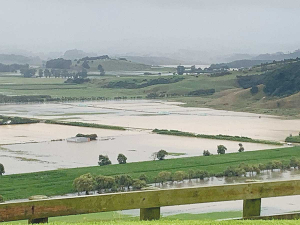Keep Your Food Safe This Festive Season: NZ Food Safety Tips
New Zealand Food Safety (NZFS) is reminding New Zealanders to keep food safety top of mind as they head into the festive season.
 Vegetable growers in Pukekohe were hit hard by the recent flooding. Onions, spinach, broccoli and carrots are the crops hardest hit as flood water swamped paddocks like this one in Pukekohe.
Vegetable growers in Pukekohe were hit hard by the recent flooding. Onions, spinach, broccoli and carrots are the crops hardest hit as flood water swamped paddocks like this one in Pukekohe.
In the aftermath of recent flooding, which struck Auckland, the Coromandel, the Waikato and the Bay of Plenty late last month, food safety concerns have been raised.
New Zealand Food Safety (NZFS) says the flooding has created significant food safety risks.
“The floodwaters that have inundated growers’ properties may have been contaminated by a variety of hazards, the sources of which may not be immediately apparent. These hazards are a food safety risk and can cause illness,” NZFS deputy director-general Vincent Arbuckle told Rural News.
He says these hazards include sewage, animal excrement and leaks from home septic tanks, resulting in unsafe bacteria, viruses, and parasites; dead animals and decaying plants; chemical contaminants like pesticides, heavy metals, and petroleum products; and physical contaminants like glass and debris.
Arbuckle says NZFS’s advice is that if a farm has been flooded with potentially contaminated water, and not just pooling rainwater, the impacted fruit should not be harvested or consumed and should be destroyed.
“If the fruit or vegetable has not been directly affected by floodwaters, meaning that the edible parts of the crops have not been submerged by floodwaters or have not been in contact with splashing floodwater, growers should conduct a risk assessment to consider how the produce can be safely harvested and whether it is safe to be consumed,” he adds.
“Produce that has been damaged only by rain, and which has not come into contact with any floodwater, should be safe to consume.”
Meanwhile, Nick Story, Ministry for Primary Industries (MPI) director of rural communities and farming support says financial support is available to those impacted by the floods. This includes the $200,000 announced by the Ministers of Agriculture and Rural Communities at the beginning of the month.
“MPI, councils, other relevant government agencies, Māori primary sector and industry organisations are meeting regularly to discuss next steps.”
He says Rural Support Trusts in the impacted areas will take a lead role in coordinating assistance.
“As well as recovery coordination, the Rural Support Trust help serve communities with wellbeing support, including organising local events and arranging recovery facilitators who work oneto- one with farmers and growers,” Story told Rural News.
“We will continue to work closely with sector groups on-the-ground and assess conditions. If there is further need for help, then we will consider what further assistance government can provide.”
South Island dairy farmers will soon be able to supply organic milk to Fonterra.
Norwood has announced the opening of a new Tasman dealership at Richmond near Nelson next month.
Buying or building a rural or semi-rural property? Make sure you know where the wastewater goes, says Environment Canterbury.
With collars on more than seven million cows worldwide, Nedap says its standalone launch into New Zealand represents world-leading, reliable and proven smart technology solutions for dairy farmers.
Entries have opened for the 2026 Fieldays Innovation Awards.
Animal welfare is of paramount importance to New Zealand's dairy industry, with consumers increasingly interested in how food is produced, not just the quality of the final product.

OPINION: Meanwhile, red blooded Northland politician Matua Shane Jones has provided one of the most telling quotes of the year…
OPINION: This old mutt has been around for a few years now and it seems these ‘once in 100-year’ weather…